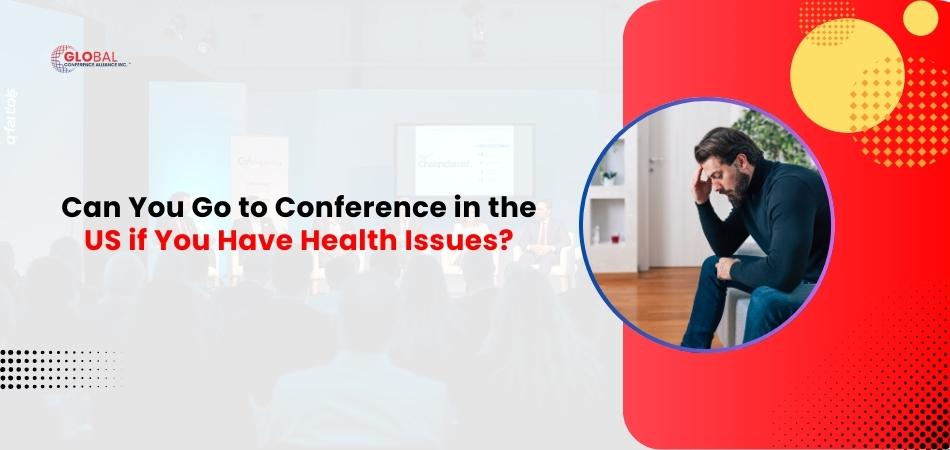Many events happen across the United States, bringing professionals together. People travel to attend, staying current with trends. Yet, a question arises for those with medical concerns: Can you go to conference in the US if you have health issues?
Yes, you can attend a conference in the US with health issues by consulting your doctor, arranging travel insurance for pre-existing conditions, carrying essential medical documents, and ensuring accessible accommodations. Planning ahead is key to managing your health while attending the event.
If you’re curious about further details, we invite you to explore the article below. Here, you’ll find practical tips on staying healthy and prepared during your upcoming trip. Prepare yourself with knowledge so you can confidently attend your planned event.
Can You Go to Conference in the US if You Have Health Issues?
Traveling to the US for a conference can feel daunting if you have health issues. Planning and reviewing the requirements beforehand is essential to ensuring a smooth experience. Here are detailed insights into managing this process effectively.
Consult with Your Doctor First
Before planning your trip, have a thorough consultation with your doctor about your health condition and travel plans. They can help identify any potential risks, suggest medical precautions, and provide a letter of medical clearance if necessary. This ensures you are fit for travel and can receive medical support if needed while attending the conference.
Research Your Destination’s Facilities
You should familiarize yourself with the healthcare facilities available in the area where the conference will take place. If you are attending an international conference in USA, make sure there are nearby hospitals, clinics, or pharmacies that can cater to your specific health needs. This preparation ensures you are not caught off guard in case of an emergency.
Carry Essential Medical Documents
Be sure to pack your medical documents, including your health history, list of prescriptions, and insurance details. This documentation will help you access quick and effective medical assistance should you need it during your conference trip. It’s also a good idea to keep these documents in both physical and digital formats for easier access.
Arrange Comprehensive Travel Insurance
Travel insurance that covers pre-existing medical conditions is a must when attending a conference abroad. Make sure the policy covers medical expenses related to your health condition. Additionally, check if the insurance covers medical emergencies, which could be helpful if you need to return home urgently due to health reasons.
Pack Your Medications Strategically
Make sure that you bring enough of your prescription medications for the entire trip, along with a few extra doses for emergencies. Keep your medications in their original packaging and bring a copy of the prescription with you. This will make traveling through customs smoother and ensure you have access to what you need while abroad.
Inform Organizers About Your Condition
Reach out to the conference organizers before your trip and inform them about any special health needs or accommodations you may require. Many conferences offer assistance for individuals with health concerns, such as providing accessible seating, rest areas, or allowing extra time for activities. It’s helpful to let them know early.
Plan for Accessibility and Transportation
If you have mobility issues or other health-related concerns, make sure to research accessible transportation options at your destination. The US offers a range of accessible public transport options, including taxis and ridesharing services, which can ensure that you move around comfortably while attending the conference and exploring the area.
Take Breaks and Stay Hydrated
Attending a conference can be physically demanding, especially when managing health conditions. Schedule regular breaks to rest, stretch, and rehydrate. Avoid overexerting yourself by taking it slow and pacing yourself throughout the event. If you feel fatigued, don’t hesitate to step away and take a short break for recovery.
Have Emergency Contacts Ready
Before traveling, create a list of emergency contacts, including local doctors, hospitals, and your country’s embassy. Share this information with a trusted friend, family member, or the conference organizers, so they can help in case of a health emergency. Having these contacts ready can provide peace of mind and assistance if something unexpected happens.
With proper planning and precautions, attending a conference in the US while managing health issues can be an enriching experience. By following these tips, you can ensure your health and safety are prioritized, allowing you to focus on the event and enjoy your time there.
Are There Any Specific Health Risks Related to Attending a US Conference You Should Consider?
Although attending a conference can be a worthwhile and exciting experience, there are some health risks to consider. Knowing these risks will help you stay prepared and safe. Here are some specific health concerns to consider before attending a US conference.
Crowded Spaces and Airborne Illnesses
Conferences often host large groups of people, increasing the chance of catching airborne illnesses like the flu or common cold. When crowded, germs can spread easily. Wearing a mask, sanitizing your hands regularly, and avoiding close contact can help reduce your risk of getting sick during the event.
Dehydration and Poor Nutrition
During busy conference days, it’s easy to forget to stay hydrated and eat healthy meals. Limited food options or long hours between meals may lead to dehydration or poor nutrition, affecting your energy and focus. Carry a water bottle, snack on fruits or nuts, and plan for proper meals to avoid fatigue.
Mental and Physical Fatigue
The fast-paced nature of conferences can be exhausting both mentally and physically. Sitting for long hours, walking between sessions, and trying to absorb a lot of information can cause tiredness or discomfort. Taking breaks, stretching, and making time to relax can help you stay focused and energized throughout the day.
Sleep Disruptions
Traveling or adjusting to a new time zone may disrupt your sleep schedule, affecting your overall health. Lack of sleep can weaken your immune system and leave you feeling drained. Try to maintain a sleep routine, even while traveling, to stay rested. Prioritize relaxation before bedtime to sleep better.
Stress and Anxiety
Conferences can sometimes be overwhelming, especially when there’s pressure to network and absorb a lot of information. The stress of managing your schedule and interactions can lead to anxiety or burnout. Finding time to breathe, setting realistic goals, and managing expectations can help keep your stress levels under control during the event.
By taking steps to manage these health risks, you can have a more enjoyable and productive conference experience. Focus on staying healthy, and you’ll be able to make the most of the event.
Steps to Manage an Extended Stay in the US Due to a Medical Condition
If a medical condition unexpectedly extends your stay in the U.S., you need to handle the situation wisely. Proper planning can help you meet both health and legal needs. Here are a few steps you can take to manage such circumstances effectively.
Seek Medical Guidance Immediately
If your health condition requires you to stay longer, consult a local doctor or healthcare provider immediately. They can provide the necessary care and documents explaining your medical situation. These records might be essential for addressing legal or logistical requirements related to your extended stay.
Contact Your Insurance Provider
Reach out to your health insurance company to understand your coverage while in the U.S. Verify if your current policy supports extended medical care or if additional coverage is needed. This ensures your medical bills don’t become a financial burden during your stay.
Inform Your Workplace or Institution
Notify your employer, university, or other relevant parties about your extended stay. Explain your health situation and provide any necessary documents to avoid misunderstandings. Focusing on your recovery will be easier if you organize your responsibilities while you are away.
Address Immigration Requirements
If your medical condition means you need to stay beyond your original visa period, you may need to extend your conference visa in the USA. Speak with an immigration attorney or check official government resources for guidance on how to apply for an extension under these circumstances.
Plan for Logistical Needs
An extended stay may require additional planning, including securing accommodations, transportation, or daily essentials. Ensure your support system, such as family or friends, is informed and available to help you. Staying organized can make this unexpected situation easier to handle.
Managing an extended stay due to a medical condition requires careful attention to health, legal, and logistical matters. With the right steps, you can address your needs while staying within the guidelines.
What Documentation is Needed to Extend Your Stay in the US For Medical Reasons?
Extending your stay in the US for medical reasons requires careful planning and the right documentation. It involves demonstrating that you need to stay in the US for treatment and complying with US immigration laws. Below are the essential documents you’ll need to prepare.
- Medical Statement: A letter from your doctor or healthcare provider explaining the need for additional medical treatment in the US, along with the expected duration of care.
- Medical Records: Copies of your medical records, including diagnosis and treatment details, showing the necessity of extending your stay for ongoing medical care.
- Form I-539: This form is used to request an extension of your stay. You’ll need to fill it out and submit it with the necessary supporting documentation.
- Proof of Financial Support: Evidence that you can financially support yourself during your extended stay. This could include bank statements or sponsorship letters.
- Passport Copy: A copy of your valid passport showing your current visa status and the date of your last entry into the US.
- Insurance Coverage: Proof of medical insurance coverage that will be valid during your extended stay, ensuring you can afford medical expenses while receiving care.
- I-94 Form: A copy of your most recent I-94 form, which records your arrival and departure details, to demonstrate your current legal stay in the US.
Gathering the necessary documentation to extend your stay for medical reasons is crucial for a successful application. Make sure to complete the process accurately and submit all required documents on time.
How Can Attendees With Diverse Backgrounds Ensure Smooth Entry Into the US For Conferences?
Participating in a conference in the US requires preparation to ensure compliance with immigration requirements. Different personal circumstances may need additional attention. Proper planning and being familiar with the process are key to avoiding complications. Here are a few practical steps for a smooth entry.
Know Visa Requirements
Before traveling to a conference in the US, make sure you understand which visa is required. Typically, a B-1 visa is needed for conference attendance. Ensure you meet all criteria and submit accurate documents during the application process. Properly addressing this step can avoid delays or rejections when you apply for your visa.
Prepare Supporting Documentation
Make sure you have the right documents when applying for a US visa and when arriving at customs. Key documents include an invitation letter from the conference organizer, proof of your travel plans, and evidence of financial support. These documents help confirm your intentions and eligibility to attend the conference smoothly.
Disclose Relevant Personal Details
If you have any previous legal or visa issues, be upfront about them when applying. For example, if you’re attending USA conferences with criminal record, disclosing this in advance can avoid complications. Full disclosure ensures that immigration officers can assess your eligibility and handle any concerns that may arise upon your arrival.
Check Customs and Immigration Policies
Make sure you follow US customs policies to avoid issues after arrival. Familiarize yourself with prohibited items, and make sure your documents are easy to access during inspection. Keeping your papers and travel itinerary organized will help speed up your entry and reduce potential delays at customs or the immigration checkpoint.
Consult Legal or Immigration Experts
If your case is unique or complicated, consulting with an immigration expert is a good idea. This is especially helpful if you have previous visa issues, unique documentation requirements, or specific questions regarding your background. Professionals can guide you through the process and reduce the risk of any unexpected complications.
Careful preparation and understanding of the visa and entry requirements will help attendees from diverse backgrounds enter the US for conferences without hassle. By following these steps, you can ensure that your entry is smooth and worry-free.
Frequently Asked Questions (FAQs)
When planning to attend a conference in the US while managing health concerns, you may have several questions about the process. Below, we address some of the most common queries to help you prepare effectively and ensure a smooth experience.
Can You Travel to the US With Mobility Equipment?
Yes, you can travel to the US with mobility equipment. Airlines and transportation services accommodate wheelchairs, walkers, and other devices. Notify the airline about your equipment when booking, so they can make necessary arrangements. Ensure your equipment is properly labeled and packed to prevent damage during transit.
Is It Safe To Travel After Surgery for a Conference?
Traveling after surgery depends on your recovery stage and your doctor’s advice. Consult your healthcare provider to determine if it is safe. If approved, take precautions like carrying medical clearance documents, wearing compression socks, and ensuring access to healthcare at your destination in case of complications.
How Can You Access Special Assistance at Airports?
Airports offer special assistance for travelers with health issues. Request services such as wheelchair support, priority boarding, or help during security checks when booking your flight. Most airports also have accessibility counters to address specific needs, ensuring a comfortable experience throughout your journey.
What Should You Do If You Fall Ill During The Conference?
If you fall ill during the conference, seek immediate medical attention. Conference venues often have medical facilities or staff on-site to assist attendees. Additionally, knowing the location of nearby clinics or hospitals can help you access care quickly. Inform the event organizers about your condition if necessary.
Can You Request Dietary Accommodations at Conferences?
Yes, most conferences accommodate dietary restrictions for attendees with health concerns. Notify the organizers in advance about your specific needs, such as allergies or special diets. This will help them arrange suitable meal options. Carrying your snacks or meal replacements is also a good backup plan.
Do You Need To Notify TSA About Medical Devices?
Yes, it is advisable to notify TSA about any medical devices you carry, such as insulin pumps or oxygen tanks. Provide a doctor’s note or medical ID card to clarify their purpose during security checks. TSA agents are trained to handle such items discreetly and professionally.
Bottom Line
Managing health concerns while attending a conference in the US can be difficult, but it can also be a rewarding experience if you plan. From consulting with your doctor to organizing necessary documents, preparation is key to ensuring a smooth trip and focusing on your goals.
So, can you go to conference in the US if you have health issues? Yes, you can, as long as you take precautions and make the necessary arrangements. By addressing your health needs and informing organizers of any special requirements, you can participate confidently and make the most of the event.
As you plan your trip, remember to carry essential medical documents, pack medications carefully, and prioritize rest during the conference. Stay prepared, stay positive, and enjoy the opportunity. Wishing you a healthy and successful conference experience!








